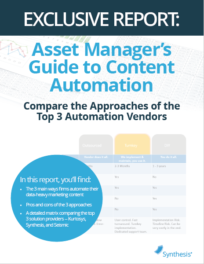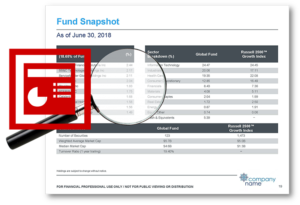Why Data Management Should Drive your Document Automation Vendor Decision

One of the criteria often overlooked by asset managers during the vendor evaluation process is data management.
The urge to minimize the data problem during these discussions is understandable. Document or website production is the marketing team’s goal. Data aggregation and quality control shouldn’t be part of the marketer’s life, but very frequently it is. This is a challenge that should be addressed clearly and upfront in evaluating document automation options.
In beginning conversations, the first thing we try to find out is how their firm is currently handling data. We do this because data really lies at the heart of the communication problem; the question of how to clean up your communication effort goes hand in hand with the question of how your data process will be addressed. Thus, as you’re defining your document automation requirements, it’s wise to look at your data management scenario. In doing this, you determine whether you have the bandwidth and skills in-house to implement quality data feeds and controls or whether outsourcing is the better or more realistic option.
In this blog, we are going to discuss why your data process should drive your automation vendor decision. There are a variety of different kinds of vendors who can automate your marketing documents. So, you’ll want to determine whether you want a vendor/product that requires internal data source and process management or a vendor who will take responsibility for creating and supporting a quality data process.
What is your current data management situation?
The truth is that most firms still rely heavily on Excel to manage data, which can be problematic. We see a high correlation between negative document production results and the use of manual data sources and ad-hoc processes. You may take a certain level of comfort in knowing that nobody has this problem 100% figured out or perfect. One IT manager told us in an interview, “It was nice to hear that other clients were in the same situation that we were in. It seems crazy, but we’re almost embarrassed about how our data is set up.”
The reason for the frequency of this problem is usually quite simple; the data source and quality scenarios for many companies is really complicated. We see companies requiring dozens of data sources to support the reporting on even a small number of products. This challenge does not go away just because we want it to or via a magic pill. The accounting group, product group, performance and analytics groups, and reporting team are all doing real hero work to create and verify the numbers that go into the documents.
Unless you already have a great data management solution in place serving the specific and ever-evolving needs of the marketing department, this issue will be a key criterion in your planning for communication automation.
It takes a considerable amount of effort to get the data prepared for automation, and your final strategy may depend on your firm’s resources and propensity to insource or outsource these types of projects. It deserves to be repeated here that ineffective data management is the #1 bottleneck in the marketing production process. High-quality data management processes are your ticket to competitive advantage and risk management, and should not be minimized when selecting the right automation partner.
In-house data management and DIY solutions
DIY document automation products typically require you to normalize your data. Then, you map the data yourself using a field-to-field mapping process. This can be done successfully, but a company choosing this round needs to be aware that this requires real and ongoing support to ensure the source files are right, consistent and perfectly formatted every time. Solutions based on this prerequisite will only be as successful as these inputs and your internal data support efforts allow. Even minor issues or changes will become real document problems. Then, you’ll have to ensure that the right people are available at all times to detect and solve data problems. If the data file formats or fields do get slightly altered unknowingly, it will be on your marketing and data teams to figure out the root of the problem and keep the document process on track.
So, if you find yourselves leaning toward a DIY solution we suggest getting your data teams involved early and plan for the resources needed for initial setup and implementation as well as ongoing support of data loading and troubleshooting. Make sure they know that your reporting business problem is not static and you’ll need support for changes and issues for the lifetime of the initiative. If your IT team has a solid data warehouse, make sure they are prepared to deliver quality data in the format required every month and quarter, and to support your needs as your documents and products change.
Carefully analyze the time and resources needed from the marketing and data teams to support a DIY implementation. Firms with skilled internal talent, resources, and a solid data management system in place often lean towards self-service solutions. Also, many firms tend to overstate their ability to support these processes for the long term. Or, they under-estimate how specific and ongoing the marketing group’s needs are. The risk is that every hour you save in “document production” is mitigated by an hour spent preparing or troubleshooting the data enabling the automation.
We’ve also observed that that DIY solutions often take longer to implement than an outsourced solution as described below. The reason for this is that the whole process is being done for the first time. So, there’s a real learning curve. You’ll have to give your timeline an allowance for this learning curve and the occasional misstep. In one case study, marketing leadership described their DIY implementation process as an 18-month project requiring 25 people. Once implemented, they estimated needing a support staff of 15. This is likely an extreme example of the cost of a DIY data and document automation process, but it clearly illustrates that achieving real results with these internal projects is not an overnight affair.
Outsourcing data management to a vendor
We’ve found that firms who recognize achieving a good result in automation require real knowledge, time and expertise lean toward vendors with more comprehensive service offerings and real data management expertise. The complexity of the data also drives this decision.
Vendors with deep data management functionality can take spreadsheets from disparate sources and formats and database them. That way, it can be normalized and validated as part of the automation process. They should also be able to plug into existing data warehouses and third-party sources and act as a data mart to provide exactly what the marketing team needs… including calculations, transformation, and formatting. When something changes in a data file, a validation report will catch it during the loading process. Then, it will kick out an error. This data validation feedback loop has two benefits. It keeps the process in motion, so factsheets get out on time and the manual QA required is cut down. A quality vendor of this nature will also have a support staff monitoring, checking and fixing errors and problems proactively. It’s their job to do this and to do it well.
The real benefit to an aggregation and warehousing solution is a clearly defined process to provide, test and track data. A data approval process is sometimes even included. The goal is to avoid scenarios where the marketing department is taking responsibility for data collecting and checking and replacing them with clear and auditable processes. Similarly, there is a party that clearly takes responsibility for the process. They have the time and incentives to continually work to keep the data humming. Separating this data responsibility allows marketing teams to focus on more value-added projects rather than just getting documents out.
The takeaway
Thoughtfully consider your true data situation and let that guide your automation vendor decision. DIY solutions will require more effort on your part to prepare, implement, and support the data. If you can’t sustainably support this effort in-house, there are vendors that can support you. It’s important to solve the data side of the document automation equation proactively. Otherwise, your automation solution will never be as successful as economical as hoped for. As one IT manager put it, “Every time we’ve done automation projects with vendors, it’s always been spreadsheets and it’s always been a nightmare for the reasons that spreadsheets are difficult to code to. If the vendor’s done that and been successful in it, that’s a nice thing to know right out of the gate.” So, understand your data situation and how the vendor’s data expertise matches your needs. This is probably the most important factor in making your decision.
Thank you for reading this post. If you’d like to learn more, I’m happy to talk with you about your data situation and automation needs. Feel free to reach out to me directly by email.
Here are some related resources that might interest you:






 Compare the Top 3 Finserv Content Automation Vendors [White paper]
Compare the Top 3 Finserv Content Automation Vendors [White paper] Create Pitchbooks the Drive Sales [White paper]
Create Pitchbooks the Drive Sales [White paper] Build vs. Buy: Should Your Financial Services Firm Outsource or Insource Marketing Technology? [White paper]
Build vs. Buy: Should Your Financial Services Firm Outsource or Insource Marketing Technology? [White paper]  10 Tips for Rebranding your Fund Marketing Documents [White paper]
10 Tips for Rebranding your Fund Marketing Documents [White paper]




